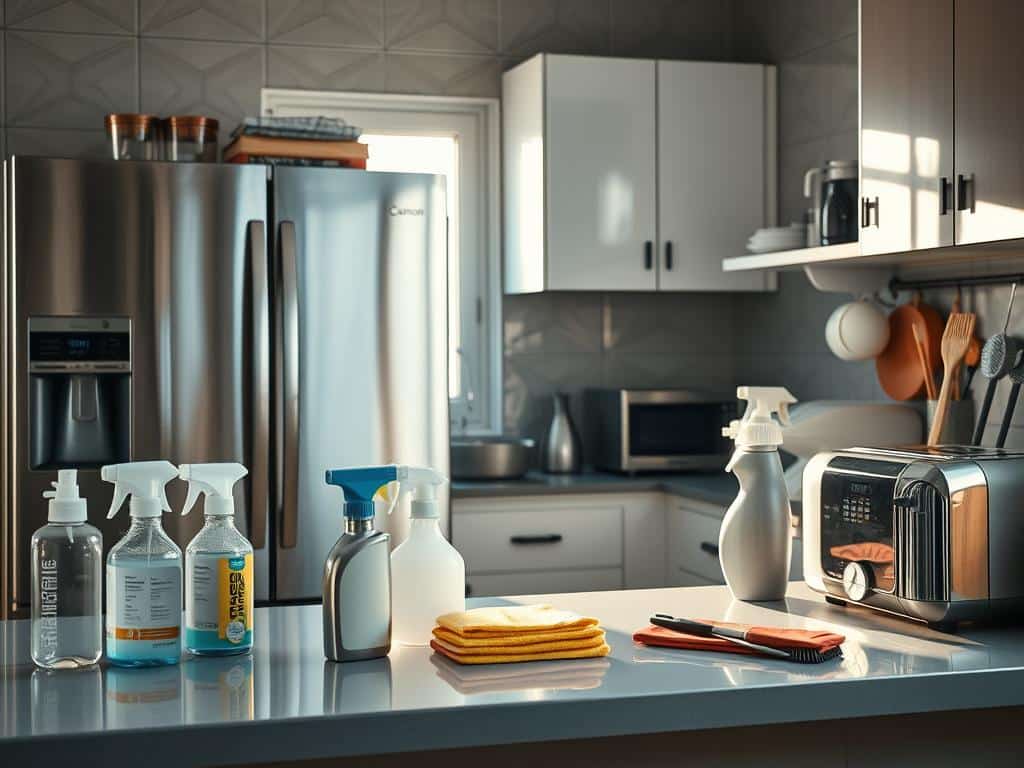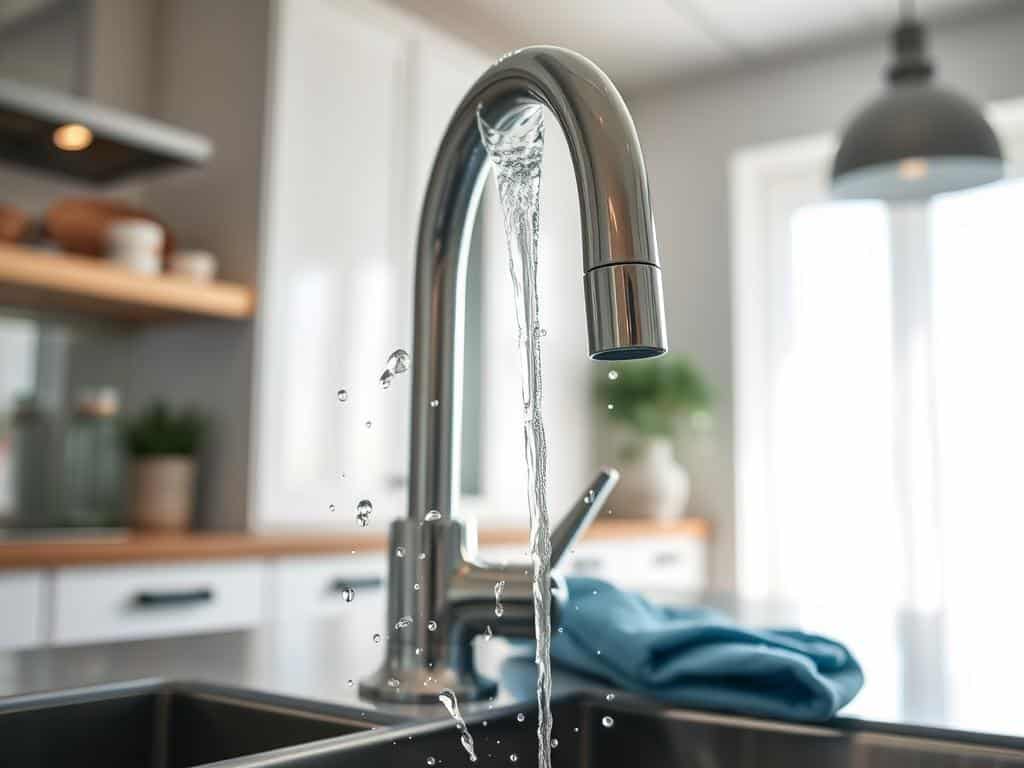
Keeping your kitchen appliances sparkling clean is essential for both aesthetic appeal and maintaining kitchen cleanliness. Utilizing an effective cleaning techniques ensures not only a hygienic cooking environment but also prolongs the lifespan of your devices. From the large refrigerator that houses your food to the compact coffee maker that starts your day, each appliance requires specific care to perform optimally.
A comprehensive appliance cleaning guide is indispensable for cultivating a clean and hygienic kitchen space. Vacuum the condenser coils of your refrigerator at least twice a year to ensure proper cooling efficiency. Regularly descaling your coffee maker to eliminate mineral buildup is crucial for both the taste of your coffee and the functionality of the machine. Your dishwasher will perform better and last longer if you routinely clean the filter to prevent clogs.
By adhering to these effective cleaning techniques, you can vastly improve the performance and longevity of all your kitchen appliances. Not only does this guide help you maintain kitchen cleanliness, but it also transforms your cooking space into a more efficient and enjoyable environment.
How to Clean Your Refrigerator
A well-kept refrigerator is key to maintaining a clean kitchen. Simple steps can help keep it fresh and clean, preventing sticky spills and foul odors. Consistently removing expired or spoiled food items is essential for overall fridge maintenance and kitchen hygiene.
Step-by-Step Refrigerator Cleaning
Begin by mixing a 1:1 vinegar and water solution in a spray bottle. This food-safe cleaner is perfect for wiping up spills and messes as they happen. For a thorough cleaning, remove all interior shelves and drawers to tackle hidden surfaces and the door gasket. Utilize baking soda and water for wiping off spills on jars, bottles, or cans. Remember to regularly clean and maintain refrigerator coils to enhance efficiency and prolong the lifespan of your appliance.
It’s recommended to do a deep clean seasonally. Often, simple tools like clean towels, a vacuum, and a long soft-bristled brush are sufficient. For stubborn stains, use undiluted vinegar directly. Avoid using bleach for safety reasons.
Maintaining a Clean Refrigerator
Preventative measures play a significant role in fridge maintenance. Weekly disposal of spoiled produce and leftovers prevents recurring odors and sticky spills. Incorporating organizational practices can also help keep your fridge clutter-free, ensuring good kitchen hygiene.
Specific cleaning recommendations for water dispensers and ice maker filters are outlined in your owner’s manual. Regularly cleaning condenser coils helps regulate fridge temperature. Consult an appliance repair professional for in-depth cleaning if you experience extensive mold growth or significant malfunctions.
Using natural ingredients like baking soda and warm water can effectively clean surfaces and remove mold without harsh chemicals. Whirlpool offers additional resources for caring for and organizing your refrigerator.
- Recommended cleaning frequency: every three months
- Cleaning supplies: dish soap, hot water, baking soda
- Safety tip: Avoid bleach
- Organizing: Utilize Spillproof Glass Shelves
- Look for deals on cleaning products and refrigerators with a fingerprint-resistant finish
By following these refrigerator cleaning tips and maintaining a regular cleaning schedule, you’re ensuring a clean and efficient appliance, contributing to better kitchen hygiene.
Cleaning Your Dishwasher Properly
Despite the dishwasher’s role in cleaning dishes, it requires regular care to function efficiently and stay odor-free. Understanding the importance of a proper dishwasher cleaning routine can make a significant difference in your kitchen’s hygiene and your appliance’s performance.
Routine Dishwasher Cleaning
Several brands recommend performing a thorough dishwasher cleaning at least once a month. If you prewash dishes or use the dishwasher occasionally, it may not need cleaning as frequently, but it shouldn’t go without cleaning for longer than six months. Adopting a regular dishwasher cleaning routine is crucial for preventing unwanted residue, such as minerals, grease, grime, and limescale buildup, which can compromise its performance over time. Cleaning the dishwasher filter weekly is essential for maintaining the dishwasher’s functionality.
Here is a basic routine you can follow:
- Remove and clean the dishwasher filter if it is manual. This should be done monthly to ensure no trapped food particles affect the appliance.
- Wipe the door and door gasket weekly to remove any greasy residue or splatters.
- Run a cleaning cycle monthly with a dishwasher-safe bowl filled with one cup of distilled white vinegar placed on the top rack. Perform this on the hottest cycle without detergent to fight residue and buildup effectively.
- After running the vinegar cycle, sprinkle some baking soda across the bottom of the dishwasher and run another hot cycle for extra freshening.
Deep Cleaning Tips for Dishwashers
For those who need to deep clean your dishwasher, more steps are necessary to remove tough grime and enhance the machine’s lifespan. Deep cleaning your dishwasher should cover the door, accessories, and spray arms.
Follow these steps for a more thorough clean:
- Use a soft toothbrush to scrub away any trapped debris around the dishwasher door, detergent dispenser, and spray arms.
- For stubborn hard water deposits, use lemon juice instead of vinegar, as it can be more effective against mineral buildup.
- Soak removable parts like racks and utensil holders in white vinegar to remove accumulated grime.
- If your dishwasher has stainless steel interiors, avoid using bleach or bleach-containing cleaners to prevent potential damage.
- Cleaning the dishwasher drain monthly is crucial to prevent blockages and odors.
- Consider polishing the exterior with a stainless steel cleaner designed specifically for appliances to maintain a streak-free shine and repel dirt and smudges.
By keeping up with regular dishwasher maintenance, you can ensure cleaner dishes, better efficiency, and an extended lifespan for your appliance. Regular care and small daily habits, like cleaning out bits of food, can prevent odor problems and keep your dishwasher running smoothly.
Microwave Cleaning Made Easy
Maintaining a clean microwave is essential for hygienic cooking and optimal appliance performance. According to a survey by the National Sanitation Foundation (NSF), over 48% of microwave handles and keypads in American homes tested positive for harmful bacteria. This underscores the importance of integrating microwave cleaning hacks into your routine. Here’s how you can effortlessly sanitize your microwave.
Quick Microwave Cleaning Method
For a rapid and efficient cleaning process, one of the most tried-and-true microwave cleaning hacks involves natural ingredients. Start by mixing a tablespoon of white vinegar or lemon juice with a cup of water in a microwave-safe bowl. Microwave this mixture for 2 to 5 minutes until it boils and produces steam. The steam will loosen food debris and splatters, making it easier to wipe down the interior with a soft cloth or sponge.
Regularly clean your microwave turntable to avoid buildup. You can wash the turntable by hand with soapy water or place it in the dishwasher if it’s dishwasher-safe. This quick cleaning solution ensures that your microwave remains free from odors and stains.
Additional Tips for a Clean Microwave
Consistency is key when it comes to keeping your microwave clean. Experts recommend cleaning your microwave about once a week to prevent messes from caking on, which makes subsequent wipe-downs easier. Additionally, always remember to wipe down the microwave exterior and interior after each use.
For enhanced cleanliness, consider using baking soda mixed with water to deodorize your microwave. This natural cleaning option effectively eliminates lingering odors. Furthermore, some microwaves like those from Whirlpool feature special settings such as Steam Clean, which leverages steam and water for easier, more efficient cleaning without extensive scrubbing.

Lastly, don’t forget about the microwave filters. Grease filters should be cleaned monthly or as indicated by the filter status indicator to maintain appliance performance and odor control.
By following these quick cleaning solutions and incorporating routine maintenance, you can easily sanitize your microwave and enjoy a cleaner, more functional kitchen appliance.
Cleaning Your Oven Effectively
Regular oven care is essential for maintaining an efficient and effective kitchen. Modern ovens often include a self-cleaning feature, utilizing extremely high heat to incinerate persistent grease and food spills. This method, albeit time-consuming—typically taking around 3 to 6 hours—largely simplifies the cleaning process. However, traditional oven cleaning techniques are still relevant, especially for those without the self-clean feature.
For a manual clean, start by heating a pan filled with water in the oven at 300-350 degrees Fahrenheit for about 30 minutes. This creates steam that can help loosen grime. A dishwashing soap mixture can then be used to scrub down the interior, addressing various cooking residues like oil splatters and seasoning spills. Lemon juice is another effective natural cleaner for persistent grease removal.
According to Real Simple, deep cleaning your oven every 3 months is recommended for frequent users. For occasional users, cleaning every 6 months to once a year is generally sufficient. Additionally, performing light cleaning once a month can prevent build-up and make deep cleaning easier.
Choosing between oven cleaning techniques can depend on your model. Some newer models offer a steam cleaning feature, providing an alternative to the conventional high-heat self-cleaning approach. Regardless of the method, regular oven care not only keeps your appliance in good condition but also ensures better-tasting food and a more efficient kitchen.
If owning a pet or having little ones, it’s advisable to keep them away during the cleaning process to ensure their safety. Proper pre-cleaning steps, as mentioned in Squeaky Cleaner Homes, like clearing pathways and moving furniture, can also contribute to a smooth and effective cleaning session.
| Type of Cleaning | Frequency | Duration |
|---|---|---|
| Self-cleaning | As needed | 3-6 hours |
| Manual deep cleaning | Every 3 months | 13-14 hours |
| Light cleaning | Once a month | 30 minutes to 1 hour |
Cleaning Small Kitchen Appliances
Taking care of small kitchen appliances is essential for maintaining an efficient and well-functioning kitchen. Regular cleaning and maintenance not only extend the lifespan of your devices but also enhance appliance efficiency. Below, you’ll find valuable tips on general maintenance for small appliances and specific instructions for coffee maker cleaning.
General Maintenance for Small Appliances
Paying attention to small appliance care can significantly improve their durability and performance. Here are some general maintenance tips:
- Regular Wipe-Downs: Frequently wipe down exteriors of devices like toasters and blenders using a microfiber cloth and a mild soap solution.
- Monthly Cleaning Routine: For appliances like air fryers and slow cookers, a monthly thorough cleaning with a mixture of vinegar and baking soda can help tackle tough stains and buildup.
- Regular Inspections: Inspect sealing rings on devices like Instant Pots every few months. Replacement may be necessary after around 1.5 years.
- Cleaning Crumb Trays: Toasters should have their crumb trays emptied regularly to prevent buildup and potential fire hazards.
- Professional Servicing: Stand mixers, especially brands like KitchenAid, can benefit from professional servicing. Companies offer kits and troubleshooting tips for common issues.
How to Clean a Coffee Maker
One of the crucial elements of small appliance care is maintaining your coffee maker. Regular coffee maker cleaning can not only enhance appliance efficiency but also improve the taste of your coffee. Follow these steps for an effective cleaning:
- Prepare Cleaning Solution: Mix two cups of distilled white vinegar with an equal amount of water.
- Run Cleaning Cycle: Pour the solution into the coffee maker’s water reservoir and start a brewing cycle.
- Rinse Cycle: Once the vinegar solution has cycled through, run two additional cycles using only water to rinse out any remaining vinegar.
- Clean Removable Parts: Remove the coffee maker’s filter basket, carafe, and any other removable parts. Clean them with warm soapy water, then rinse and dry thoroughly.
- Wipe Down Exterior: Use a damp microfiber cloth to wipe down the exterior of the coffee maker for a clean finish.
Integrating these small appliance care practices into your routine will ensure your kitchen devices run smoothly and efficiently for years to come. Happy cleaning!
| Appliance | Cleaning Material | Frequency |
|---|---|---|
| Toaster | Microfiber Cloth, Mild Soap | Weekly |
| Air Fryer | Vinegar, Baking Soda | Monthly |
| Coffee Maker | White Vinegar, Water | Monthly |
| Blender | Dish Soap, Warm Water | Weekly |
Conclusion
Embracing a comprehensive kitchen cleaning routine is pivotal for a hygienic kitchen environment and the longevity of your appliances. By incorporating regular maintenance, not only do you enhance the functionality of your kitchen gadgets, but you also create a welcoming and calm cooking space. Strategies such as vacuuming refrigerator coils monthly, soaking stovetop burners in soapy water, and descaling coffee makers with a vinegar solution can significantly prolong appliance life and boost performance.
Maintaining a clean kitchen helps in preventing food-borne illnesses by ensuring countertops, utensils, and appliances are free from bacteria, mold, and pests. This reduces the risk of cross-contamination and preserves the freshness of ingredients. A clutter-free kitchen also saves time during meal prep and cooking, making your culinary activities more efficient and enjoyable.
In addition, regular appliance cleaning not only improves indoor air quality by removing grease and cooking odors but also reflects a healthy, efficient, and inviting home. For example, running a vinegar cycle in your dishwasher, steaming your microwave to easily wipe away baked-on food, and cleaning refrigerator coils regularly can contribute to a cleaner and safer kitchen space. For more detailed guidance on cleaning various home items, you can visit this expert guide.
Remember, a well-maintained kitchen is the cornerstone of effective food preparation and a healthy household. Prioritizing the cleanliness of your kitchen can save time, reduce stress, and extend the life of essential appliances, ensuring that your kitchen remains the heart of your home for many years to come.



